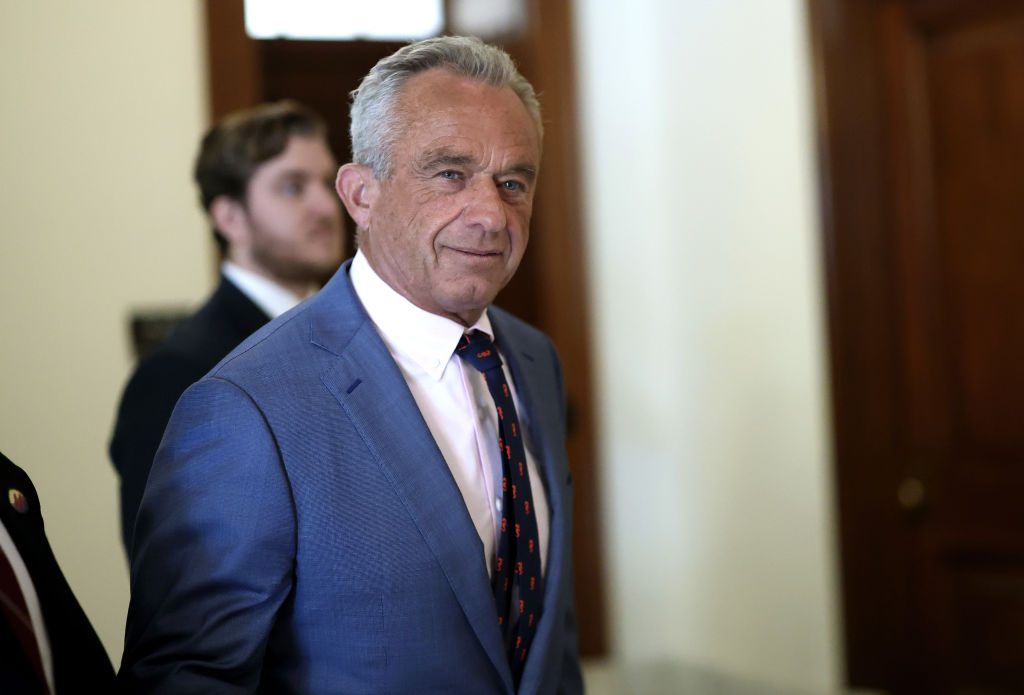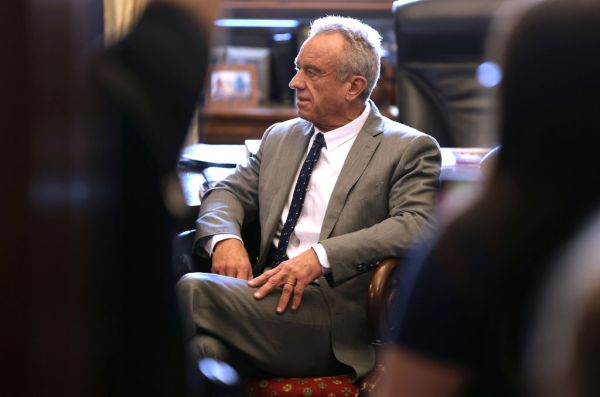Among all of President-elect Donald Trump’s most controversial Cabinet nominees, it’s remarkable that Robert F. Kennedy Jr. has so far coasted through Capitol Hill on his way to his confirmation hearing.
Kennedy, whom Trump has nominated to lead the Department of Health and Human Services, has a reputational rap sheet that would make Matt Gaetz blush: his bizarre obsessions with animals (dead and alive), his claim to have been infected with brain worms, an allegation of sexual assault from a former babysitter, his promotion of conspiracy theories about the assassinations of his father and his uncle, and his diary of dozens of sexual conquests discovered by his second wife (who shortly afterward committed suicide). That’s all on top of the various positions that Kennedy—a heretofore lifetime Democrat and member of the famous first family of liberalism—has held at odds with the Republican senators whose votes he’ll need.
While some in the GOP are seeking to get reassurances that Kennedy will not upset policy goals of the pro-life community or the agricultural industry, there seemed to be little concern from Republican senators on Capitol Hill this week over his menu of junk-science remedies to “Make America Healthy Again.” Kennedy offers something for nearly everyone who has some level of skepticism about America’s institutions in the health, nutrition, and medical spheres: Going after the Food and Drug Administration and the National Institutes of Health, ridding the water supply of fluoride, questioning the safety of vaccines and the pandemic-era restrictions, targeting processed foods like pasteurized milk and “seed oils.”
And there is some evidence that a large number of Americans are receptive to some part of what Kennedy is selling.
Some new polling conducted on behalf of Phillip Morris International points to how broad the skepticism and dissatisfaction with public health has become. The post-election survey of Americans who voted in this year’s election found 51 percent say public health in the United States is “getting worse.” And a full 89 percent say they agree that it’s important the incoming Trump administration “dedicates time and resources to improving the health of the nation.” Furthermore, the poll found that 62 percent agree that reforming the FDA should be a “top priority” for Trump’s administration.
Despite those findings, the poll’s questions are worded broadly enough that it’s difficult to draw specific conclusions about policy matters. Who could be against improving public health? But the poll has less to say about whether Americans really want more or less medical research funding, an expansion or reduction in government health insurance programs, or more or fewer regulations on medicine and food. Should FDA reform by cutting back on or adding to its regulations, by fast-tracking drug approvals or slowing them down? And how well do American voters understand what the federal government can and cannot do when it comes to, well, “Making America Healthy Again”?
Another post-election survey, from the Republican polling outfit Echelon Insights, looked a little closer at the relative popularity of some alternative health trends—and found that among Trump supporters, interest is significantly higher than the average. The poll found 32 percent of voters say they support removing fluoride from drinking water, but among those who say they voted for Trump in 2024, that number jumped to 45 percent. The same phenomenon can be seen when it comes to avoiding seed oils: 18 percent of all voters agree that people should “avoid seed oils” while 28 percent of Trump voters agree with that statement. And while 21 percent of voters said they support “avoiding vaccines” in general, 34 percent of Trump voters said they agree with that statement.
These numbers reflect, in part, the power of the “wellness women,” as the journalist Elaine Godfrey dubbed them: the network of social-media influencers whose own crusade against the established science of health and medicine fits hand-in-glove with the Kennedy “MAHA” message. It’s individualistic, suspicious of received wisdom, and reliant on lots of alternative pseudoscience. And the online platforms for the wellness women are massive and, well, influential. Hell hath no fury like a Facebook mom concerned about GMOs in her kids’ applesauce.
So it’s no surprise that elected Republicans (and even some Democrats) seem to have intuited that Kennedy’s health agenda has a constituency, even if it hardly constitutes a majority of their own voters.
“He’s asking tough questions, questions that need to be asked,” said Sen. Bill Hagerty of Tennessee on Fox News this week. “And if you think about what’s happening here in America, chronic disease is on the rise. We need to be asking these tough questions.”
The problem is that Kennedy has already come up with answers to many of these “tough questions,” though he has done so without complete evidence or clear reasoning.
Vaccines and autism? Since 2005, when he published the article “Deadly Immunity” in Rolling Stone, Kennedy has made and amplified claims that vaccines, particularly those that use a mercury-based preservative called thimerosal, have caused an uptick in the incidence of autism in children. (Both Rolling Stone and Salon, which reprinted the piece, issued so many corrections and amendments raised by medical experts that both retracted the article six years later. But the damage was done, and Kennedy had helped create an entire industry of vaccine skepticism driven by false conclusions and flawed studies.)
Fluoride in the water supply? He claims it’s “an industrial waste associated with arthritis, bone fractures, bone cancer, IQ loss, neurodevelopmental disorders, and thyroid disease” and that Trump should call for water systems to remove it. (The risks of fluoride are low and the benefits for dental health significant.)
Genetically modified organisms and ultra-processed food? He insists that the obesity epidemic in America is driven by “poisoned food,” defined by Kennedy as “ultra-processed wheat, sugar, and flour,” “seed oils,” pesticide-treated crops, dairy pasteurization, and food additives. (Obesity is a complex public health problem with many factors, and Kennedy exaggerates the risks of seed oils, pasteurization, and food additives.)
The threat of Covid? Kennedy once posited that the virus was “ethnically targeted” to harm Caucasians and blacks while leaving Ashkenazi Jews and Chinese people mostly immune. He also compared the public health policies during the height of the pandemic to the actions of Nazi Germany. (There are plenty of unanswered questions still about the origin of the Covid-19 virus, and the incidence of infection did have racial disparities, but there is no evidence the virus was created to target people of a certain race. Nazi Germany oppressed, imprisoned, and murdered millions of people, which is hardly the same as issuing temporary stay-at-home orders during a once-in-a-century pandemic.)
The New York Times reported last week that a top lawyer for Kennedy, Aaron Siri, has actually petitioned the federal government to revoke its approval for the polio vaccine. The paper reported that Siri has been among those interviewing prospective officials at HHS, setting off more questions about what sort of policies Kennedy will implement if confirmed.
Trump, the skeptic-in-chief, got out in front of these criticisms of Kennedy’s views at a press conference on Monday, with both him and later Kennedy himself saying they support the polio vaccine. “I think he’s going to be much less radical than you would think,” the president-elect said.
One interpretation of that comment is that Trump intends to rein in Kennedy’s worst impulses on health and nutrition. Another might be that what Kennedy plans to offer is not as out-of-the-mainstream as some may hope.







Please note that we at The Dispatch hold ourselves, our work, and our commenters to a higher standard than other places on the internet. We welcome comments that foster genuine debate or discussion—including comments critical of us or our work—but responses that include ad hominem attacks on fellow Dispatch members or are intended to stoke fear and anger may be moderated.
With your membership, you only have the ability to comment on The Morning Dispatch articles. Consider upgrading to join the conversation everywhere.